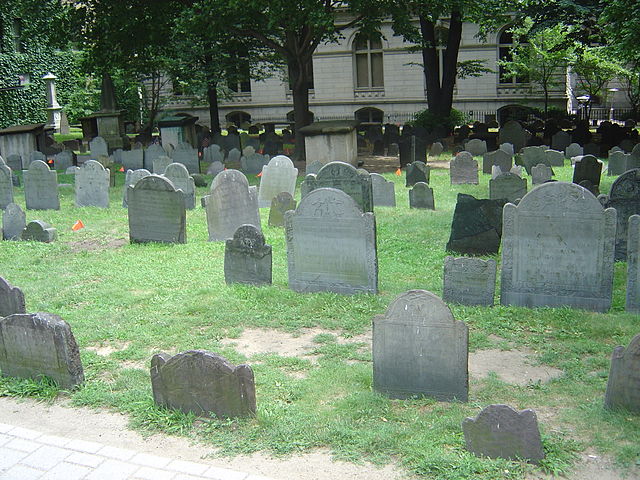Studying the Schoolmasters’ Salaries
There were five town schools—two grammar or Latin schools and three writing schools. However, not all the teachers were compensated equally. Here are the salaries for the masters at each school:
- John Lovell, South Latin School (shown here): £120.
- Samuel Hunt, North Latin School: £100.
- John Proctor, Queen Street Writing School: £100.
- Samuel Holbrook, South Writing School: £100.
- John Tileston, North Writing School: £100.
The disparity was even more pronounced when we add in the salaries that the meeting approved for each assistant master or usher:
- James Lovell, usher, South Latin School: £60, plus £40 “as an encouragement for him to remain and exert himself in the Service of the Town the ensuing Year.”
- James Carter, usher, Queen Street Writing School: £50, plus £25 for encouragement.
- Assistant for the South Writing School, to be named later: £50.
- Assistant for the North Writing School, to be paid through Tileston: £34.
At the South Writing School, Samuel Holbrook had become master partway through the school year after the death of his uncle Abiah, but he’d taught at the Queen Street School years before. His assistant might have been John Fenno, born in in 1751 and thus also still under age.
James Carter was an experienced teacher who would take over the Queen Street Writing School in a couple of years, which is probably why the town offered him “encouragement” to stay on the job.
But Boston really encouraged James Lovell at the South Latin School, paying him as an usher as much money as every master but his father. He was a Harvard graduate working under his father, and people might have felt he was turning away better prospects. Indeed, later that year, the congregation at Christ Church invited Lovell to preach during a dispute with their pastor, the Rev. Mather Byles, Jr.
That disparity in spending on the different schools becomes even more stark when we look at the number of children each of those schoolteachers served. Here’s how many scholars a town committee found at each school a couple of months later in 1770:
- South Latin School, 137 boys.
- North Latin School, 56 boys.
- South Writing School, 231 boys.
- Queen Street Writing School, 268 boys.
- North Writing School, 250 boys.
Meanwhile, the town was spending £459 to educate the other 749 boys in the practical skills of handwriting and arithmetic. That was £0.61 per pupil.
Clearly the system favored the students at the Latin Schools, most of them coming from the town’s richer families. Though Boston prided itself on its public schools, the system wasn’t equitable. (And about half of the boys in town of school age weren’t in the public schools at all. Not to mention no girls or black children.)
There was one more piece of business for Boston’s 8 May 1770 town meeting: to vote £100 to David Jeffries “for his Services as Treasurer of the Town the Year past, and for all his Expences in that Office.” Someone had to pay the schoolmasters.



